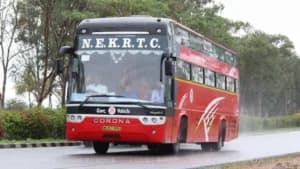The Karnataka High Court recently heard a crucial matter regarding the State's ban on bike taxis, as women commuters voiced strong opposition, describing bike taxis as a safe, affordable, and convenient travel option.
A division bench led by Acting Chief Justice V. Kameswar Rao and Justice C.M. Joshi was hearing appeals filed by Ola, Uber, and Rapido, challenging a single judge’s earlier decision. That order had prohibited the operation of bike taxis until the State Government framed appropriate guidelines under Section 93 of the Motor Vehicles Act, 1988.
Read Also:- Bike Owners Challenge Karnataka Bike Taxi Ban in High Court, Cite Commuter Impact and Legal Provisions
The April order had made it clear that unless such guidelines were notified, aggregators like Ola and Uber cannot offer bike taxi services. It also barred the Transport Department from registering motorcycles as transport vehicles or issuing contract carriage permits. As per the court directive, all bike taxi operations in the state were to cease from June 16, 2024.
During the hearing, senior advocate Jayna Kothari, representing a woman commuter, stated:
"Though the scheme is cancelled citing safety concerns, for daily commuters like my client, bike taxis are the safest, most convenient, and affordable option."
She urged the court to allow women commuters to be heard before final decisions are made, stressing that their experiences must guide policy decisions.
Read Also:- Why did Karnataka High Court Issue Notice on Proton Mail’s Appeal Against Blocking Order?
When the court asked about safety measures in other states, Kothari responded:
"In many states, pre-qualification tests and background checks are mandatory. West Bengal restricts night operations. Some states promote women riders to enhance safety. The aggregator guidelines across states support safer commuting."
Kothari also cited Rajasthan’s bike taxi policy, under which driver background checks and police verification are essential, and minors are barred from operating. Fares are fixed by the state and remain lower, making the service highly affordable.
Quoting national research, she added:
"There are reports by independent agencies recommending bike taxi services. A KPMG report concludes that bike taxis are the most convenient, affordable, and safer commuting option."
She explained that the KPMG study conducted a feasibility analysis showing that bike taxis outperformed other transport methods in terms of affordability and safety, especially for women.
Read Also:- Why Karnataka High Court Praised Hindus and Muslims of Yadgir District, What Happened?
Senior advocate Uday Holla, appearing for Uber, supported the arguments by highlighting that Tamil Nadu and Kerala had previously banned but later allowed bike taxi services.
Commenting on Bengaluru’s metro infrastructure, he said:
"There are just two metro lines. Last-mile connectivity is missing. Even if more lines are added, they won’t serve the city’s spread."
Holla stressed on worsening traffic conditions in Bengaluru:
"Earlier, I could travel across Bengaluru in 20 minutes. Now, during peak hours, it takes 3 to 4 hours. A commuter can’t even spend time with family anymore."
Responding to safety concerns raised by a 2019 expert committee, Holla argued:
"This fear around women’s safety is a misrepresentation. The opposition is largely due to pressure from strong auto-rickshaw unions."
He also pointed out that the state cannot refuse registration of bike taxis and emphasized that aggregators simply help locate rides, not own them.
Concluding his submission, he noted a direct 18% rise in traffic congestion after bike taxis were halted:
"Without bike taxis, people have resorted to private cars, worsening congestion. In places like London, public transport is so efficient that personal cars are almost unnecessary."















